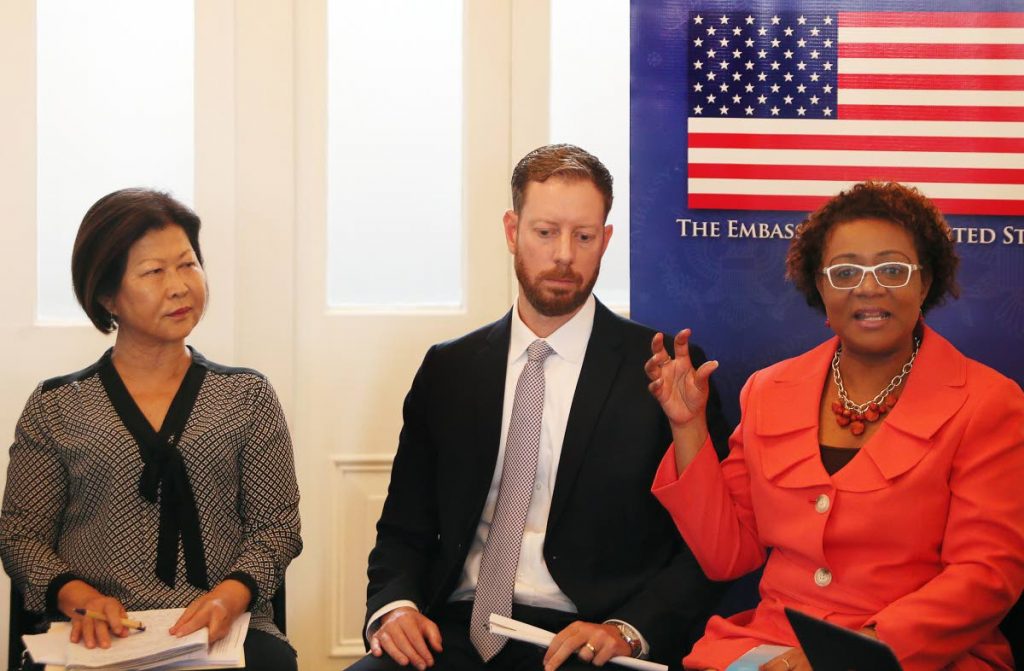‘Missing people are not trafficked’

NO missing person has ever found to have become the victim of human-trafficking in TT, said Alana Wheeler, head of the Counter Trafficking Unit (CTU) in the Ministry of National Security.
Her revelation, which contradicts a widely held belief in TT that missing people have been trafficked into forced prostitution, came at a panel discussion on trafficking at the Writers Centre, Alcazar Street, St Clair, on Thursday. Helping to clear up the differences between terms such as human-trafficking (coerced) and migrant smuggling (voluntary), Wheeler said these topics are dogged by many myths and misconceptions.
“When we discuss human trafficking, we think it is important you discuss it from an informed perspective rather than hearsay.
“Missing persons is not a trafficked person. Persons can go missing and may end up trafficked, but we have not found a case in Trinidad as yet, I can say. However those things do occur in many of the Asian countries and stuff.”
Wheeler also revealed that TT has not had any cases of human trafficking victims being exploited for the forced removal of their internal organs. However she said local movie, Trafficked, had highlighted one form of exploitation of trafficking victims, namely the use of victims for the transportation of an illegal items (such as narcotic drugs.) Other types of exploitation she listed were sexual exploitation, forced labour, domestic servitude.
Panelist Kyle Fonay of the United States Embassy said human trafficking victims are defined as being victims of “fraud, force or coercion.” If any of these three factors are present, then consent has not been truly given, even if the victim had signed a contract.
Jewel Ali of the International Office of Migration said migrant smuggling is defined as transporting a person across international borders, whereas human-trafficking can occur either internationally or internally within a country.
Panel moderator Dr Angelique Dixon said that in the Americas, trafficking victims far often end up doing domestic work rather than sex work, although some blurring of these two types of exploitation can occur.
Wheeler underlined the role of grooming in trafficking. “One of our first cases was three Colombian girls recruited and smuggled to TT and who ended up exploited for sexual exploitation.” She said the girls had been lured by someone who knew them and their families, by a process known as grooming. “The person befriends you and your relatives, and gets to learn your vulnerabilities and will then isolate you from the people you know. By the time you agree to come, you’ve already been duped.”
Counsellor Natalie O’Brady picked up on Wheeler’s theme of how victims could be vulnerable to being tricked. She said people susceptible to becoming trafficking victims are those who have first been victims of child abuse, physical abuse, sexual abuse, family violence and instability in the family.
Given these pre-disposing factors for individuals to be lured by traffickers, O’Brady said, “So it is not exactly a choice. I have experienced multiple traumas in my life and am looking for a way out.” She said a good salary dangled in front of these individuals seems to offer a way to take care of all their problems.
O’Brady said traffickers condition victims to get them to comply with their wishes, and so go beyond what they had initially agreed to do. This may be by way of physical harm or by giving allowances such as going outside or to the beach. Again putting herself in a victim’s shoes, O’Brady said, “It continues to compromise my ability to make decisions. So did I really have a choice? My decision-making capacity has been compromised.”


Comments
"‘Missing people are not trafficked’"